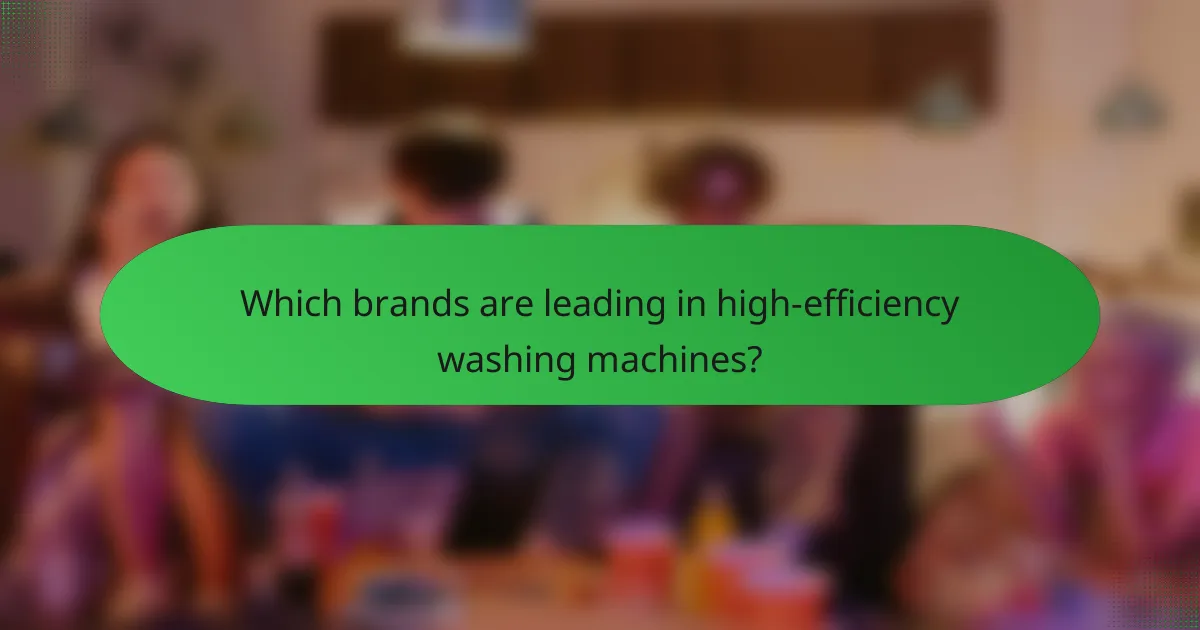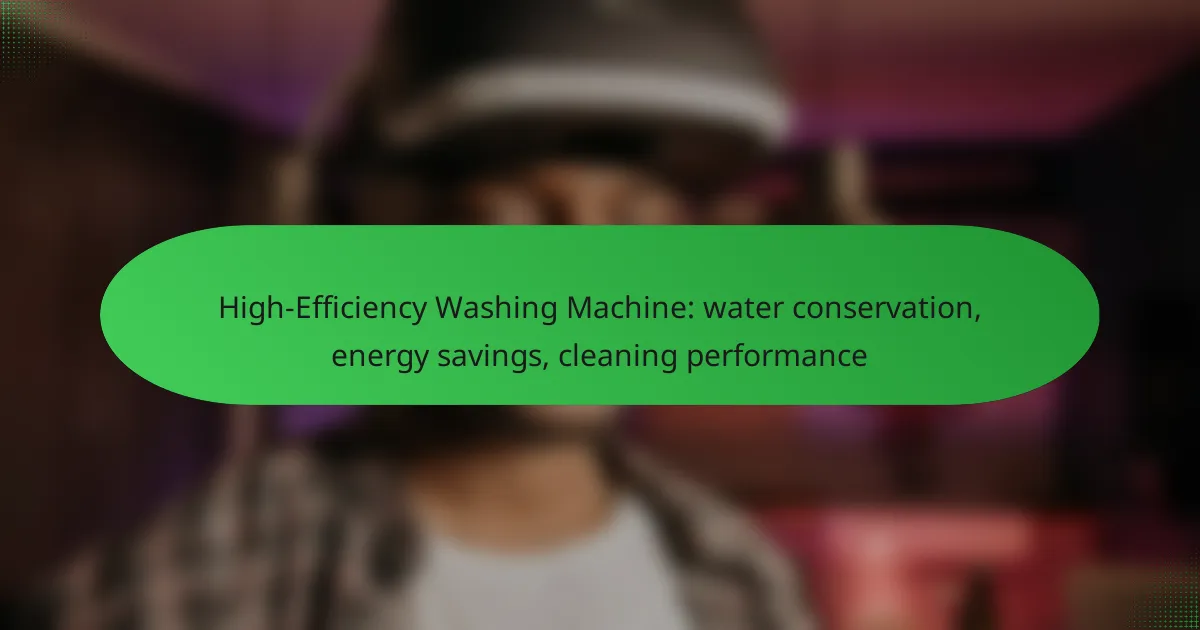High-efficiency washing machines are designed to conserve water and energy while delivering exceptional cleaning performance. By utilizing advanced technologies, these machines use significantly less water per cycle and reduce electricity consumption by 20-50%, all without compromising on cleaning effectiveness. Their innovative design ensures optimal agitation and rinsing, resulting in cleaner clothes compared to traditional models.

How do high-efficiency washing machines conserve water in the UK?
High-efficiency washing machines in the UK conserve water by using significantly less water per cycle compared to traditional models. They achieve this through advanced technologies and eco-friendly wash programs that optimize water usage while maintaining effective cleaning performance.
Reduced water usage per cycle
High-efficiency washing machines typically use around 40-60% less water per cycle than standard models. This reduction is crucial for households looking to minimize their water bills and environmental impact. For instance, while a conventional machine may use 100 liters per wash, a high-efficiency model may only require 40-60 liters.
Advanced load sensing technology
Many high-efficiency washing machines are equipped with load sensing technology that automatically adjusts the water level based on the size and weight of the laundry load. This ensures that only the necessary amount of water is used, preventing waste. As a result, users can wash smaller loads without using excessive water.
Eco-friendly wash programs
Eco-friendly wash programs in high-efficiency machines are designed to optimize both water and energy usage. These programs often operate at lower temperatures and longer wash cycles, which can save water while still providing effective cleaning. Users should consider utilizing these settings for everyday laundry to enhance water conservation efforts.

What energy savings can be expected from high-efficiency washing machines?
High-efficiency washing machines typically offer significant energy savings compared to traditional models, often reducing electricity usage by around 20-50%. These machines achieve this through advanced technology that optimizes water and energy consumption while maintaining effective cleaning performance.
Lower electricity consumption
High-efficiency washing machines are designed to use less electricity by employing features like faster spin cycles and improved motor technology. This results in lower energy bills, as these machines consume less power per load compared to conventional washers. Users can expect to see a noticeable reduction in their monthly electricity expenses.
For example, a traditional washing machine might use about 1.5 kWh per load, while a high-efficiency model may only require 0.5-1 kWh. Over time, this reduction can lead to substantial savings.
Energy Star certification benefits
Many high-efficiency washing machines come with Energy Star certification, indicating they meet strict energy efficiency guidelines set by the U.S. Environmental Protection Agency. These certified models not only consume less energy but also often qualify for rebates and incentives from utility companies.
Purchasing an Energy Star-certified washing machine can provide peace of mind, knowing that you are contributing to energy conservation while potentially benefiting from lower utility costs and rebates that can offset the initial purchase price.
Long-term cost savings
Investing in a high-efficiency washing machine can lead to long-term cost savings that extend beyond energy bills. These machines often have a longer lifespan and require fewer repairs, which can further reduce overall ownership costs.
In addition to energy savings, users may find that they spend less on water bills, as high-efficiency models typically use less water per load. Over several years, the cumulative savings on both water and electricity can amount to hundreds of dollars, making these machines a financially sound choice for many households.

How do high-efficiency washing machines perform in cleaning?
High-efficiency washing machines excel in cleaning by utilizing advanced technology that optimizes water and energy use while delivering superior results. Their design allows for effective agitation and rinsing, ensuring that clothes come out cleaner compared to traditional models.
Enhanced cleaning technology
High-efficiency washing machines incorporate features like load sensing, which adjusts water levels based on the size of the load, and specialized wash cycles that target different fabric types. This technology maximizes cleaning power while minimizing water use, often requiring less than half the water of standard machines.
Additionally, many models utilize high-speed spin cycles that extract more water from clothes, reducing drying time and energy consumption. This combination of features leads to a more effective cleaning process that is both eco-friendly and cost-efficient.
Effective stain removal capabilities
These machines often include specific stain removal settings that enhance their ability to tackle tough stains. By using a combination of higher water temperatures and longer wash cycles, high-efficiency washers can effectively break down and eliminate various stains, from grease to grass.
Some models also offer pre-soak options that allow for better stain treatment before the main wash cycle, ensuring that even the most stubborn marks are addressed. This targeted approach can lead to cleaner clothes with less effort.
Comparison with traditional machines
When comparing high-efficiency washing machines to traditional models, the former generally use significantly less water and energy. Traditional machines might consume around 40 gallons per load, while high-efficiency models often require only 15-30 gallons, depending on the load size.
Moreover, high-efficiency machines are designed to clean more effectively with less detergent, which can lead to cost savings over time. While the initial purchase price may be higher, the long-term savings on utilities and detergent can make them a more economical choice in the long run.

What features should be considered when choosing a high-efficiency washing machine?
When selecting a high-efficiency washing machine, key features to consider include capacity, spin speed, and noise levels. These factors significantly impact water conservation, energy savings, and overall cleaning performance.
Capacity and size options
Capacity refers to the volume of laundry a washing machine can handle in a single load, typically measured in kilograms or pounds. High-efficiency models often range from about 5 to 10 kg, making them suitable for various household sizes. Choosing the right capacity helps optimize water and energy use while ensuring effective cleaning.
Consider your household’s laundry habits when selecting size options. For smaller families, a machine with a capacity of around 5-7 kg may suffice, while larger families may benefit from machines with capacities of 8 kg or more. This choice can lead to fewer loads and lower utility bills.
Spin speed variations
Spin speed, measured in revolutions per minute (RPM), affects how much water is extracted from clothes during the spin cycle. High-efficiency washing machines typically offer spin speeds ranging from 800 to 1600 RPM. A higher spin speed can reduce drying time and energy consumption, making it a vital feature for efficiency.
However, higher spin speeds may also lead to more wear on delicate fabrics. It’s essential to balance the need for effective water extraction with the care required for different types of laundry. Look for machines with adjustable spin speed settings to accommodate various fabric types.
Noise levels during operation
Noise levels during operation can impact your comfort, especially if the washing machine is located near living areas. High-efficiency models generally operate at lower decibel levels, often ranging from 50 to 70 dB. Choosing a quieter machine can enhance your home environment, particularly during nighttime use.
When assessing noise levels, consider the machine’s design and features. Front-loading models tend to be quieter than top-loading ones. Additionally, look for machines with noise-reduction technology or vibration control features to minimize disturbances during operation.

Which brands are leading in high-efficiency washing machines?
Leading brands in high-efficiency washing machines include LG, Samsung, and Bosch. These manufacturers are recognized for their innovative technologies that enhance water conservation, energy savings, and cleaning performance.
LG high-efficiency models
LG offers a range of high-efficiency washing machines that utilize advanced technologies such as TurboWash and 6Motion. These features allow for effective cleaning while using less water and energy compared to traditional models.
Many LG models are Energy Star certified, which means they meet strict energy efficiency guidelines set by the U.S. Environmental Protection Agency. This certification can lead to significant savings on utility bills, often reducing energy consumption by up to 30%.
Samsung EcoBubble technology
Samsung’s EcoBubble technology is designed to enhance cleaning performance while conserving energy and water. This system creates bubbles that penetrate fabrics quickly, allowing for effective washing even in cold water.
Samsung high-efficiency washers typically feature a range of wash settings tailored for different fabric types, which can help optimize water usage. Models equipped with this technology can save users considerable amounts on their water and energy bills over time.
Bosch energy-efficient options
Bosch is known for its compact and energy-efficient washing machines that are particularly popular in Europe. Many Bosch models are designed to fit smaller spaces while still delivering high cleaning performance and low water usage.
These machines often come with features like ActiveWater technology, which adjusts water levels based on load size, ensuring efficient use of resources. Bosch washers are also Energy Star certified, making them a smart choice for environmentally conscious consumers.
